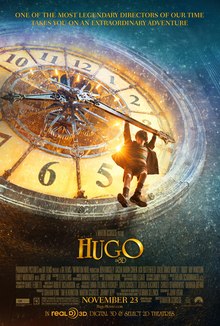Score: 8.3/10
Grade: A-
Family-Friendliness Scale: Level 4 (Great)
Kids ages 8+
Your father has died, you have a station inspector ready to capture you and take you to an orphanage, how do you survive?
The film tells the story of Hugo Cabret, a young orphan boy who lives within the walls of a Paris train station. Upon trying to find his place in the world, his now-deceased father had taught him all he needed to know about fixing things. Hugo was able to save his father's prized possession, the Autamaton, a machine that has the ability to write. The only thing that is missing, a key in the shape of a heart. As he tries to stay a few steps ahead of the cruel station inspector (played by Sacha Baron Cohen), he runs into a girl his age named Isabelle (My Friends Tigger & Pooh's Chloe Moretz), who actually has the key to his fathers' machine. Once they unlock the secret to the machine, little do they know that what it draws, will lead them on a great adventure.
Positive Notes
The film has positive messages on accepting oneself for who they are, teamwork, and how one person can make all the difference. The cast, including Ben Kingsley, Moretz, Cohen, Emily Mortimer, and Jude Law
stand out, and the sets used inside clocks and the train station are superb. Also, one thing I didn't count on is that one major keydriver this film has is movies. The film describes the earliest film cameras, as well as the earliest film strips, and its' also a major part of the films' plot. That gives the flick a bit of educational value.
Also, the film gets bonus points for its' extensive use of 3-D technology. Hugo was filmed with 3-D cameras (unlike most others that get converted to the format in editing), and it's totally worth seeing it in the format. You almost feel like you're flying in a helicopter over Paris, and snowflakes, dust, fire, and other illusions pop out of the screen.
Howard Shore brings a touching music score, and the visual effects are amazing. Even though its' not very faithful to the book (since it has a background on the history of movies), John Logan successfully writes an emotional screenplay.
Negative Notes
Some perilous scenes. A couple of very light suggestive jokes. Alcohol and cigarettes are seen a few times. Hugo lies and cheats in order to survive. One (nearly inaudible) misuse of God's name and brief name-calling. Creepy-looking hooded monk statues are seen outside of Melies' house.
While not a negative note, the film does touch on some emotional subjects that may be hard to understand or too sophisticated for younger kids.
Conclusion
Personally, I hadn't heard of Martin Scorsese (with the exception of his voice in Shark Tale), although prior to this I had heard he had made critcally-acclaimed films such as The Aviator and The Departed. But those two films were R-rated, so could he successfully direct a family movie?
During a behind-the-scenes featurette on the DVD, it is revealed that Scorsese had wanted to make a family movie for some time, since his 12-year old daughter Fransesca couldn't see any of his films. He also loved the book by Brian Selznick, and wanted to make an adaptation.
And Scorsese successfully made a movie that not only got critical acclaim, but kept it clean for families as well. Obscenities and strong violence are nowhere to be found, and instead, we get an emotionally-compelling story that features excellent special effects and strong morals on acceptance and family. And as for me, I fascinated by its' values on the early days of filmmaking.
Summarizing it, Hugo is an emotional, uplifting triumph.
